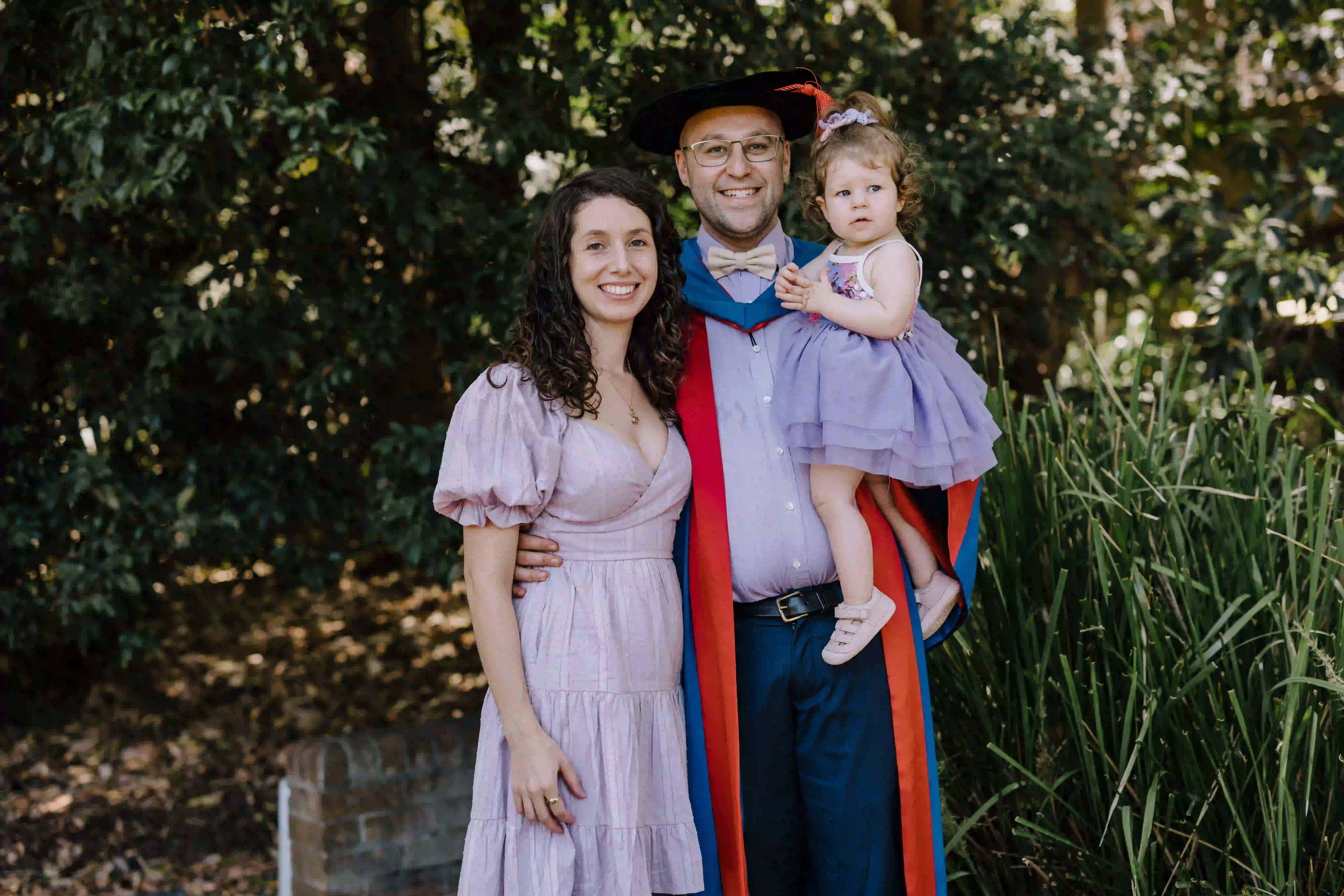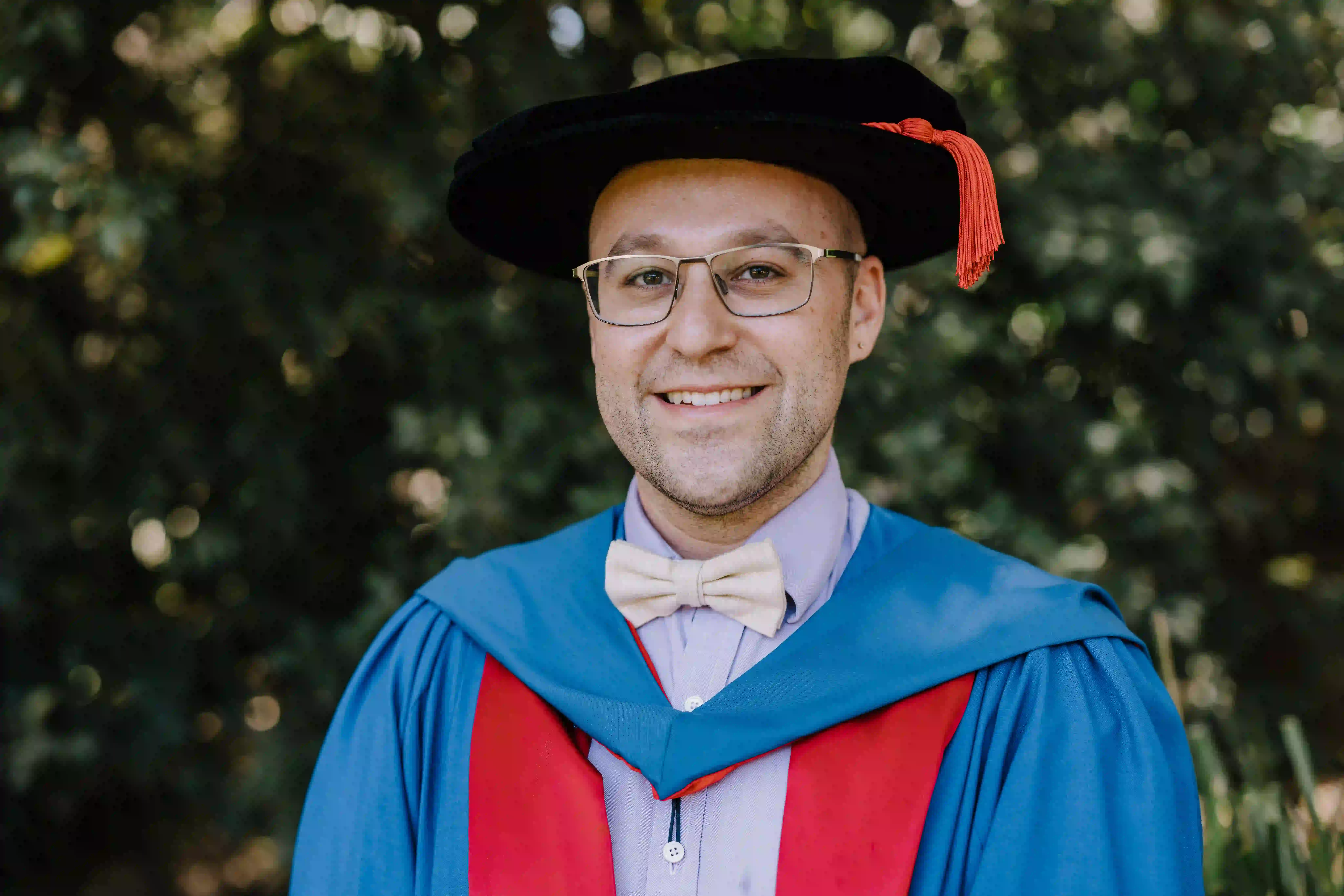October 30, 2024
From diabetes self-management to global health leadership – Dr Gideon Meyerowitz-Katz’s inspiring journey to a PhD
Dr Meyerowitz-Katz’s journey demonstrates resilience and a deep commitment to public health
The University of Wollongong (UOW) will celebrate the remarkable achievements of Dr Gideon Meyerowitz-Katz, who is graduating with a PhD that focuses on diabetes self-management applications and chronic disease management.
Dr Meyerowitz-Katz’s path to his PhD began over a decade ago when he completed his Master of Public Health at the University of Sydney. Working as an epidemiologist with New South Wales Health, his expertise in chronic disease management, particularly diabetes, became the foundation for his doctoral research at UOW. However, like many great research projects, Dr Meyerowitz-Katz’s work evolved over time to address broader and more complex challenges, including the COVID-19 pandemic's impact on health management technologies.
“I started my PhD in 2018 with the aim of exploring the role socioeconomic factors played in diabetes self-management apps. But as I dug deeper, I realised that a key issue was people simply stopping their use of these apps."
His research showed that while digital health platforms hold great promise, they often face a high attrition rate—users tend to drop off within a few months. This was especially concerning in the context of managing chronic conditions like diabetes, where continuous engagement is critical.
One of the most significant aspects of Dr Meyerowitz-Katz’s work was identifying how the COVID-19 pandemic changed the way people engaged with these apps. His research showed that during the pandemic, there was a sharp increase in the use of diabetes self-management apps, as people sought ways to manage their health remotely. However, the rise in engagement was short-lived.
“People logged in more frequently at the height of the pandemic, but usage quickly dropped back to pre-pandemic levels as restrictions eased. The challenge is capitalising on these changes long-term.”
In addition to his work on diabetes self-management, Dr Meyerowitz-Katz’s expertise was instrumental in COVID-19 research during the pandemic. His studies on the infection fatality rate of COVID-19—particularly the risks to low-income countries—earned him recognition from leading global health organisations. His research was cited by the Centers for Disease Control and Prevention and the World Health Organisation, and he was invited to discuss his findings with the United Nations and the OECD.
Dr Meyerowitz-Katz’s work showed that the infection fatality rate of COVID-19 was higher in low-income countries than initially reported, a revelation that shed light on the unequal impact of the pandemic.
“There were a lot of assumptions early on that low-income countries had lower death rates, but my research found that underreporting was likely the cause. When you correct for that, the fatality rate in low-income countries was actually double that of high-income countries.”
His findings were crucial in understanding the global impact of COVID-19 and helped shape the international response to the pandemic, particularly in terms of supporting vulnerable populations.

His PhD journey was anything but conventional. As a part-time student balancing full-time work with New South Wales Health, Dr Meyerowitz-Katz’s often found himself juggling multiple responsibilities—especially as the pandemic unfolded. His role in the COVID-19 response meant that he was working not only on his PhD but also on frontline research that informed health policy and public understanding.
But through determination and the support of his supervisors at UOW, he was able to push forward.
“UOW provided me with fantastic supervisors who helped me integrate my professional work into my academic research. That made a huge difference in keeping me motivated.”
Despite the challenges of part-time study, Dr Meyerowitz-Katz’s commitment to his field never wavered. His work was cited by international bodies, and he became a key figure in public discussions about both diabetes and COVID-19.
One of the most critical findings from his PhD research was the identification of high attrition rates in diabetes self-management applications. His research highlighted that even in well-funded clinical trials, the average user logged into the app only three times over a six-month period. This low engagement rate presents a significant barrier to effective self-management of chronic diseases.
Additionally, his work showed that while COVID-19 temporarily boosted app engagement, the shift was short-lived, raising questions about how to maintain user participation in digital health platforms long-term.
“There’s still a lot of potential in digital health tools, but we need to understand why people stop using them and how to keep them engaged. The pandemic gave us a glimpse of what’s possible, but we haven’t capitalised on it.”
His research also explored the broader implications of digital health in chronic disease management, emphasizing that these tools could play a critical role in future healthcare systems—if user engagement can be sustained.
As he prepares to graduate, he remains committed to his work in public health. Currently, he’s an adjunct senior research fellow with the School of Nursing at UOW and serves as a Research Manager at the Western Sydney Local Health District, where he oversees multiple research projects, including randomised clinical trials related to diabetes management. He continues to lead teams of researchers and clinicians in groundbreaking work, bridging the gap between academic research and real-world health solutions.
Looking ahead, Dr Meyerowitz-Katz is passionate about continuing his research and helping to shape the future of public health.
“I’m still figuring out my next steps, but I know that my work in epidemiology and public health isn’t done yet. There’s so much more to explore, especially in the realm of digital health and chronic disease management.”
His advice to future PhD students is to “focus on developing practical skills that will serve you beyond academia. It’s not just about publishing papers—it’s about what you can do with those skills. Whether it’s statistical analysis or qualitative research, the skills you develop during your PhD will define your career.”
Dr Meyerowitz-Katz’s journey is also a reminder that non-traditional paths to academia are not only possible but can be incredibly rewarding.
“You don’t have to give up your career to pursue a PhD. It’s hard work, but it’s doable if you’re passionate and committed."
He hopes his story will inspire others, particularly those in professional roles, to pursue their academic ambitions without feeling the need to choose between work and study.
